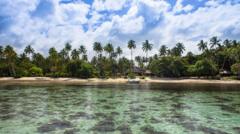In a recent diplomatic effort, Australia has signed three significant agreements with Pacific Island nations, including Nauru, Papua New Guinea, and the Solomon Islands, within a brief span of 12 days. This strategic move aims to bolster Australia's influence while addressing concerns over China's growing presence in this geopolitically crucial area.
Australia's Strategic Engagement in the Pacific: New Deals Amid Global Influence Wars

Australia's Strategic Engagement in the Pacific: New Deals Amid Global Influence Wars
Australia forges critical agreements with Pacific nations to counteract China's expanding reach in the region.
On December 20, 2024, Australian Prime Minister Anthony Albanese announced a substantial agreement worth 190 million Australian dollars (approximately 118 million USD) with the Solomon Islands. This deal intends to aid in the enhancement of their police force over a four-year timeframe. The Solomon Islands has become a focal point of intense geopolitical rivalry, particularly following its secret 2022 security pact with China, which alarmed both Canberra and Washington. This pact facilitated Chinese military presence and support during civil unrest in the islands.
Amid these developments, the Biden administration is also actively engaging in the Pacific, establishing embassies, promising investments, and facilitating regional summits to strengthen alliances against China's influence. However, the Australian agreement does not require the Solomon Islands to abandon its pact with China or restrict future agreements. Meanwhile, Chinese officials are already providing police training in the Solomon Islands, showing the complexities of influence and allegiance in the region.
These recent engagements reflect a broader strategy by Australia and its allies to maintain a significant presence in the Pacific while addressing the challenges posed by rising powers like China, indicating that the competition for influence in this area is far from over.
Amid these developments, the Biden administration is also actively engaging in the Pacific, establishing embassies, promising investments, and facilitating regional summits to strengthen alliances against China's influence. However, the Australian agreement does not require the Solomon Islands to abandon its pact with China or restrict future agreements. Meanwhile, Chinese officials are already providing police training in the Solomon Islands, showing the complexities of influence and allegiance in the region.
These recent engagements reflect a broader strategy by Australia and its allies to maintain a significant presence in the Pacific while addressing the challenges posed by rising powers like China, indicating that the competition for influence in this area is far from over.























